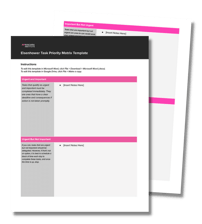5 min read
How To Identify Your Areas of Improvement at Work
You know that everyone has their faults, weaknesses, and areas of improvement at work. However, you also know that perfection is impossible to...
3 min read
 Michelle Bennett
:
Sep 15, 2022 5:00:00 AM
Michelle Bennett
:
Sep 15, 2022 5:00:00 AM

It would be hard to find someone who hasn’t experienced moments at work where they’re overwhelmed by the sheer volume of tasks to complete. It’s the feeling that there are not enough hours in the day to get everything done and being trapped by an overflowing to-do list where tasks keep piling on.
In times like these, it’s best to slow down to move faster. What do we mean by that? Instead of putting your head down trying to tackle everything, it’s best to step back and evaluate your tasks at work. When you take the time to evaluate and prioritize tasks, you can better use your time as you have assessed the most important, mission-critical tasks to do that will bring you closer to your goals.

Prioritization is the process of evaluating the importance of each task relative to each other task and arranging each task in the order from most important to least important. However, importance can be a subjective measure differing for each individual. That’s why there needs to be a second criterion: urgency.
To prioritize your tasks at work, start by plotting each task on a 2x2 chart against their level of urgency and importance. This two-by-chart is called the Eisenhower Matrix, and to make the prioritization of tasks more effortless, we’ve included a template for you to use.
The Eisenhower Matrix template is relatively straightforward when you understand the framework of urgent and important. So let’s start with defining urgent vs. important and how to prioritize tasks in each quadrant with examples.
Definition of Urgent Tasks at Work: These are tasks that require immediate attention. It could be due to a looming, or a missed deadline, solving an issue that directly impacts a client, colleagues, the running of the business, or a crisis. In short, it is any task that is time-bound in the immediate future and/or requires rapid action.
Definition of Important Tasks at Work: These tasks impact personal, team, or organizational goals. Important tasks are ones of strategic value that drive individuals and organizations forward.
Important and Urgent
Tasks that qualify as urgent and important need to go to the top of your to-do list. These are the tasks that must be completed immediately and have an impact on goal achievement. Urgent and important tasks are ones that have a clear deadline and consequences if action is not taken promptly.
Examples of urgent and important tasks:
Important but Not Urgent
Tasks that are important but not urgent are ones to keep on your to-do list to re-visit once your urgent and important tasks are completed. These tasks are of strategic value that are typically connected to long-term goals.
Examples of important but not urgent:
Not Important but Urgent
If you’re a leader or have authority to do so, not important but urgent tasks should be delegated, as these are tasks that don’t require a specific skill set. However, if delegation is not an option, it is best to schedule a block of time each day to complete these tasks, and once the time is up, stop.
Examples of not important but urgent tasks:
Not Urgent and Not Important
If you’re left with tasks determined to be not urgent and not important, you need to let them go. The visual of a shorter to-do list and knowing you’re only focusing on the most productive activities should help quell feeling overwhelmed.
Examples of not urgent and not important tasks:
When you don’t prioritize tasks, you spend energy on the latest ask instead of the most urgent and important. As a result, you feel drained and overwhelmed as your to-do list never ends, and you are not meeting your professional goals as your important long-term tasks never seem to happen. To get back on track, using the Eisenhower Matrix template and working with a coach on time-management skills are great solutions to take back control of your tasks.

5 min read
You know that everyone has their faults, weaknesses, and areas of improvement at work. However, you also know that perfection is impossible to...

4 min read
Do you want to be more intentional about how you spend your time at work? Has your boss given you feedback that your time management skills leave...

6 min read
How many times have you wished there were more hours in the day to get everything done? Unfortunately, if you feel this way at work, you’re not...